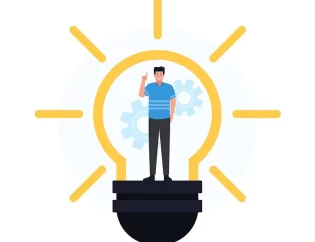While the pandemic has changed a lot about the way we work, where we work, and where we interview, the crucial aspect of preparing for a job interview hasn't changed. Whether you are a recent college graduate or a professional looking to switch careers, a virtual interview, phone interview, or in-person interview is likely on the near horizon.
Behavioral interview questions are the most commonly and consistently used prompts by hiring managers across professional fields. Nailing that interview begins with the preparation you put in, so let's get to it!
What are Behavioral Interview Questions?
Behavioral interview questions are those tricky situational questions that interviewers often ask to see how you work, behave, and respond in different environments or situations.
These open-ended questions usually prompt you to give an example or tell a personal story about how you overcame an obstacle or managed a stressful situation. The Muse breaks up 30 of the most common behavioral interview questions into 6 categories:
- Teamwork: "Tell me about a time when you had to work closely with a peer or boss whose personality was very different from your own."
- Client-Facing Skills: "Was there a time when you went out of your way to give superb customer service? Tell me what you did."
- Ability to Adapt: "Tell me about a time when changes occurred at work. How did you handle the changes and adapt?"
- Time Management Skills: "Have you ever been in a situation where you had a few projects or responsibilities to manage at once? How did you balance everything and what was the result?"
- Communication Skills: "Tell me about a time when a client was unhappy. How did you mediate the situation?"
- Motivation and Values: "Tell me about the professional accomplishment that you are the proudest of."
Before your interview with a potential employer, it's important to familiarize yourself with common questions that may be asked. While interview styles vary depending on the type of position you are applying for, at least one behavioral question is almost always asked in every interview.
Do some research and take notes of some of the behavioral interview questions that may be asked in your upcoming interview. When you have an idea of the kinds of questions that will be asked, you are much more likely to be at ease when you respond. Don't let a behavioral-based question choke you up, with a little preparation, the answer will come naturally!
Use the STAR Method
The STAR method is the most proven model of success in responding to behavioral interview questions. STAR is an acronym that stands for Situation, Task, Action, and Result. This template helps interviewees respond to Behavior-type interview questions in a way that is more structured and highlights their skills. Indeed has a great video that explains the Star technique but to sum it up:
- Situation: Give some context for the example you are providing. When did it happen? Where did it occur? What was at stake?
- Task: Explain your role in the situation. What was asked of you? What needed to be done? What was the problem that needed fixing?
- Action: This is where you explain your problem-solving skills or the actions you took to address a problem or provide a solution. What did you do? How did you react and act accordingly?
- Result: Finally, you need to tie up your answer with the outcome. What were the results of your action? How did the situation change? What improved?
The STAR interview method is super helpful in outlining your success stories and leadership skills that nail these open-ended questions and lead to potential job offers.
Preparing For Your Interview: Behavioral Questions
It is best to have merely a sentence or two for each letter of the STAR acronym or point in your response. There is usually no wrong answer in these open-ended questions. It's all about how you answer to secure a successful outcome.
You don't need to provide an excess amount of background story to give an amazing answer. Rather, you should keep it concise but provide strong details.
For example, in the final point of "Result," use the exact percentage of growth in sales that your success story drove. Choosing precise language over vague facts drives your point and sticks in the hiring manager's head for when it's decision time.
Think About Your Story
Behavioral-based interview questions are all about telling your story so that hiring managers can access your skillset and discover what motivates you. One of the best ways to approach interview preparation is to take some time to think about the most important stories in your career or journey to personal and professional growth.
Once you review some common behavioral questions, write down a couple of your own responses that come to mind. Think about the times that you exemplified what it is to be a team player or the times that you learned from a mistake or overcame a challenging situation.
If it's hard to come up with examples, you could ask a coworker or former boss if they remember any moments where you shined at work. If you're still working but plan to transition to a different job in the future, you could be proactive in your interview preparation by taking notes of these short success stories or learning points as they happen.
When you have a few examples, form your stories into the STAR model to create some sample answers. With the right preparation, you'll feel at ease and confident with the perfect answer when these behavior-based interview questions pop up and it's time to respond.
Practice Makes Perfect
Nerves and anxiety often make even the easiest questions difficult to answer during any traditional interview. Practice saying your STAR responses out loud to avoid, or at least mediate, your nerves. Your answers will flow when you practice answering these open-ended responses with confidence to yourself at home or role-playing in a mock interview with a friend.
The more you have carefully thought out your responses and say them out loud, the more it will just come naturally to you. A good trick is to record yourself with your phone in a video or voice recorder to replay your response and make sure it is clear and understandable.
How To Prepare Even Further
Scripted answers aren't necessary and often come off as robotic, so don't think of this practice as a memorization technique. It's all about getting comfortable so you don't go blank searching for responses when the big day comes.
You'll also get better with each interview, so don't kick yourself too much if you bombed a recent job interview or it didn't go as smoothly as you had hoped. Take each experience as a learning point and take notes after to narrow down what you need to do to work on or improve.
Staffing agencies can also help you get your applications in the right hands and the first step is usually an interview to get to know you, your goals, and career aims. This is also great practice and another step closer to landing your dream job.
If you're ready to take the next steps in your career and find the perfect job for you, we're here to help. Contact us today to be matched with a recruiter.
For more information on resume writing, compensation terms, and other interview tips, check out our Candidate Brief.









